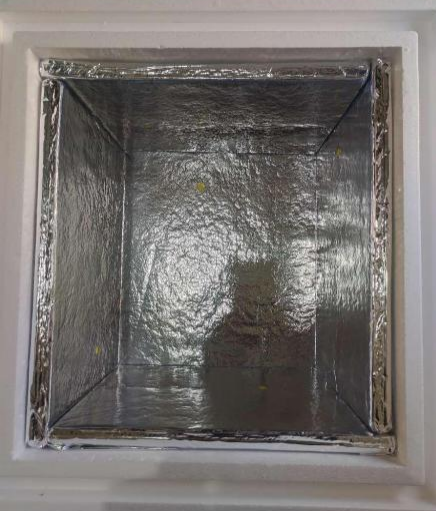Vacuum Insulation Panels (VIPs), also known as vacuum thermal panels, are highly efficient insulating materials. They consist mainly of three components: a core material, a barrier film, and a getter. The core material restricts the movement of gas molecules within the panel, thereby preventing convection and conduction of heat while providing structural support. The barrier film and getter work together to maintain the vacuum inside the panel, further reducing thermal conductivity. Generally, VIPs can be installed on the exterior or interior of objects requiring insulation to achieve a thermal effect. Due to their unique properties, VIPs have a wide range of applications in the insulation and thermal preservation industry.
Advantages of VIPs in Insulated Transportation Packaging
High Thermal Efficiency: VIPs have an extremely low thermal conductivity, significantly reducing heat transfer and effectively minimizing heat loss, which helps maintain stable temperatures during transportation.
Good Compression Strength: The structural design of VIPs endows them with strong compression resistance and durability, allowing them to withstand pressure, vibrations, and impacts during transportation.
Environmentally Friendly: VIPs are produced without ozone-depleting substances and do not emit greenhouse gases or harmful substances during use. They are also recyclable, reducing resource consumption and benefiting the environment.
Fire Resistance: VIPs offer good fire resistance, enhancing safety during transport.
Space-Saving: The thinness of VIPs reduces packaging volume, improving transportation efficiency.
Energy Saving: Using VIPs as an insulating material can significantly reduce energy consumption and lower costs.
Lightweight: The light weight of VIPs helps reduce transportation costs.
Disadvantages of VIPs in Insulated Transportation Packaging
High Cost: VIPs are relatively expensive compared to traditional insulation materials, leading to higher market prices and increased transportation costs.
High Technical Requirements: The production of VIPs is complex, requiring advanced technology and precision equipment, which limits large-scale production.
Susceptibility to Damage: The barrier film and core material of VIPs are relatively fragile and prone to physical damage, which can impair insulation performance.
High Sealing Requirements: The insulation performance of VIPs is highly dependent on proper sealing; poor sealing can degrade the thermal performance.
Installation Complexity: Installing VIPs requires professional skills and equipment to ensure optimal insulation performance.
Environmental Sensitivity: The insulation performance of VIPs can be affected by environmental factors such as humidity and pressure, requiring careful control during use.
How to Choose VIPs
When selecting VIPs, consider the following factors:
Thermal Performance: Thermal conductivity is a key indicator of VIP insulation performance. Opt for panels with lower thermal conductivity (e.g., less than 0.0025 W/m·K) for better insulation.
Compression Strength: Since VIPs may be subjected to pressure during transportation and use, choose products with high compression strength to better withstand vibrations and impacts.
Quality of Appearance: Select panels with suitable dimensions and thickness based on the size and insulation needs of the packaged items. Ensure the surface is smooth and free of defects.
Sealing Quality: Check the sealing quality of the VIPs to avoid air leakage that could compromise insulation performance.
Application Areas
VIPs are widely used in insulated transportation packaging across various sectors:
Cold Chain Logistics: VIPs are used for transporting products that require low temperatures, such as food and pharmaceuticals, ensuring temperature stability and product quality during transport.
Refrigeration Equipment: VIPs are used as insulation layers in refrigerators and freezers, enhancing insulation performance and saving energy.
Building Insulation: VIPs can also be used for building wall insulation, improving thermal efficiency and reducing energy consumption.
Case Studies
Pharmaceutical Company Example: A pharmaceutical company uses VIPs as insulation material for packaging temperature-sensitive medications. Through efficient packaging design and the high thermal performance of VIPs, the company ensures product quality while reducing energy consumption and costs during transport. The lightweight and space-saving characteristics of VIPs also improve transportation efficiency, providing significant economic benefitsCold Chain Logistics Company Example: A cold chain logistics company uses VIPs as insulation material in refrigerated trucks. This successfully reduces temperature fluctuations during transport, enhancing the freshness and stability of goods. بالإضافة إلى ذلك, due to the small size and light weight of VIPs, the company achieves lower transportation costs and higher vehicle loading rates.
How Huizhou Will Assist
In cold chain transportation, VIPs can be paired with various products to create a comprehensive insulation packaging solution through proper packaging design and sealing measures, ensuring stable temperatures during long-distance and extended transport.
If you choose us, Huizhou Industrial will not only provide VIPs but also offer refrigerants and insulation packaging materials to ensure your products maintain optimal quality and insulation during transport.
ere are the refrigerants and insulation packaging materials we can provide:
Ice Packs: Ice packs are convenient and economical refrigerants. They are easy to freeze and reuse, and they do not produce liquid during transport, keeping goods dry. In refrigerated transport, using ice packs with VIPs can extend insulation time.
Aluminum Foil Bags: These bags have an inner layer of aluminum foil and an outer layer of plastic film, offering excellent reflective properties. When used with VIPs, they further enhance insulation performance.
Foam Boxes: Foam boxes can be used as external packaging for VIPs, providing additional protection and cushioning.
Insulation Boxes: VIPs can serve as the inner lining material for insulation boxes, improving their insulation performance.
In summary, VIPs offer significant advantages and some drawbacks in insulated transportation packaging. By selecting and pairing VIPs according to specific needs and scenarios, they can effectively enhance insulation performance, reduce transportation costs, and improve product quality stability, achieving optimal insulation effects and economic benefits.
Packaging Materials Available for Your Selection






















